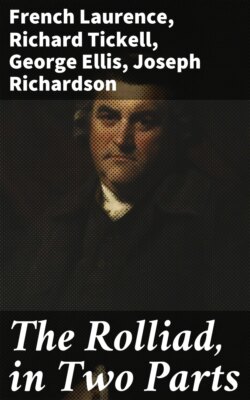Читать книгу The Rolliad, in Two Parts - George Ellis - Страница 12
На сайте Литреса книга снята с продажи.
NUMBER IV.
ОглавлениеA new edition (being the nineteenth) of this universally admired poem having been recently published, the ingenious author has taken that opportunity to introduce some new lines on an occasion perfectly congenial to his muse, and in the highest degree interesting to the public, namely, the late Fast and Thanksgiving; together with the famous discourse preached in celebration of that day by that illustrious orator and divine, the Reverend Mr. SECRETARY PRETTYMAN.—This episode, which is emphatically termed by himself in his prefatory address to this last edition, his Episode Parsonic, seems to have been written perfectly con amore, and is considered by critics as one of the happiest effusions of the distinguished genius from whose high-rapped fancy it originated. It consists of nine-and-forty lines, of which, without farther exordium, we shall submit the following extracts to the inspection, or, more properly speaking, the admiration of our readers. He sets out with a most spirited compliment to Dr. PRETTYMAN. The two first lines are considered by critics, as the most successful example of the alliterative ornament upon record.
Prim Preacher, Prince of Priests, and [1]Prince’s Priest;
Pembroke’s pale pride—in PITT’s præcordia plac’d. —Thy merits all shall future ages scan, And PRINCE be lost in PARSON PRETTYMAN.
The beauty of the historical allusion to Prince Prettyman, need not be pointed out to our readers; and the presage that the fame of this Royal personage shall be lost and absorbed in the rising reputation of the ingenious divine, is peculiarly happy and well turned. The celebrated passage of Virgil,
“Tu Marcellus eris:”
is supposed to have been in the poet’s recollection at the moment of his conceiving this passage—not that the
“Oh miserande puer!”
in the preceding line, is imagined to have excited any idea of Mr. Pitt.
Our author now pursues his hero to the pulpit, and there, in imitation of Homer, who always takes the opportunity for giving a minute description of his personæ, when they are on the very verge of entering upon an engagement, he gives a laboured but animated detail of the Doctor’s personal manners and deportment. Speaking of the penetrating countenance for which the Doctor is distinguished, he says,
ARGUS could boast an hundred eyes, ’tis true, }
The DOCTOR looks an hundreds ways with two: }
Gimlets they are, and bore you through and through. }
This is a very elegant and classic compliment, and shows clearly what a decided advantage our Reverend Hero possesses over the celebrated Οφθαλμοδουλος of antiquity. Addison is justly famous in the literary world, for the judgment with which he selects and applies familiar words to great occasions, as in the instances:
———“The great, the important day, “Big with the fate of Cato and of Rome.”—
“The sun grows dim with age, &c. &c.”
This is a very great beauty, for it fares with ideas, as with individuals; we are the more interested in their fate, the better we are acquainted with them. But how inferior is Addison in this respect to our author?
Gimlets they are, &c.
There is not such a word in all Cato! How well-known and domestic the image! How specific and forcible the application!—Our author proceeds: Having described very accurately the style of the Doctor’s hairdressing, and devoted ten beautiful lines to an eulogy upon the brilliant on the little finger of his right hand, of which he emphatically says:
No veal putrescent, no dead whiting’s eye,
In the true water with this ring could vie;
he breaks out into the following most inspirited and vigorous apostrophe—
Oh! had you seen his lily, lily hand,
Stroke his spare cheek, and coax his snow-white band:
That adding force to all his powers of speech,
This the protector of his sacred breech;
That point the way to Heav’n’s cœlestial grace,
This keep his small-clothes in their proper place—
Oh! how the comley preacher you had prais’d,
As now the right, and now the left he rais’d!!!
Who does not perceive, in this description, as if before their eyes, the thin figure of emaciated divinity, divided between religion and decorum; anxious to produce some truths, and conceal others; at once concerned for fundamental points of various kinds; ever at the bottom of things—Who does not see this, and seeing, who does not admire? The notes that accompany this excellent episode, contain admirable instances of our author’s profound knowledge in all the literature of our established religion; and we are sorry that our plan will not suffer us to produce them, as a full and decisive proof that his learning is perfectly on a level with his genius, and his divinity quite equal to his poetry.
[1] The Doctor is Chaplain to his Majesty.—He was bred at Pembroke-hall in Cambridge.
* * * * *
